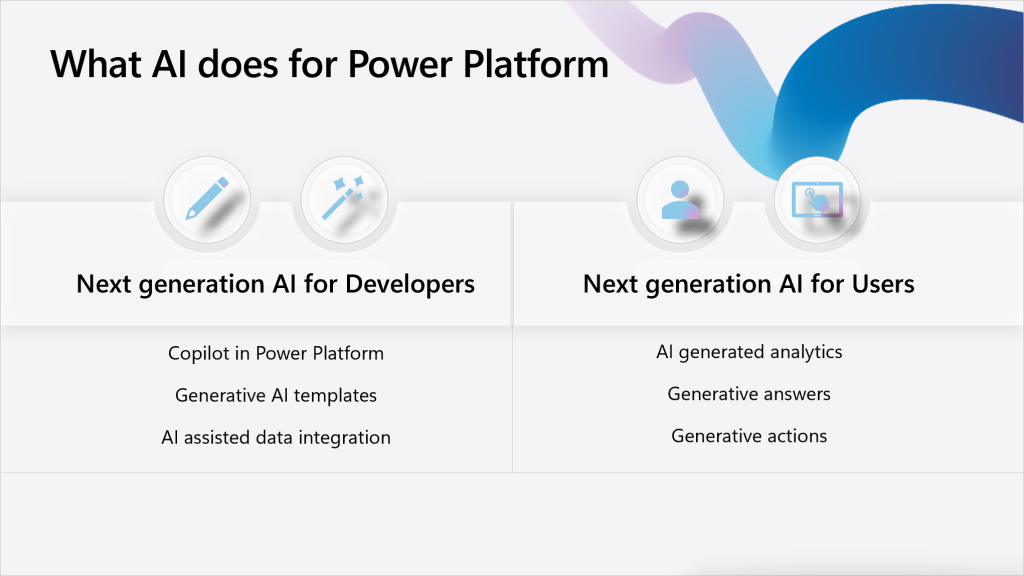Low-code platforms like Power Platform are a revolutionary approach to software development that reduce the need for extensive coding knowledge and enable users to build applications using drag-and-drop components and data model-driven logic. These platforms offer several advantages for developers and businesses, such as
- faster development speed,
- simpler creation process,
- and wider accessibility.
However, low-code platforms also face some challenges or reservation in the developer community, such as limited customization, scalability issues, and vendor lock-in.

In this episode, we will discover how Power Platform can solve these problems using AI technologies, and why CIOs should encourage their developers to adopt Power Platform low-code tools in their development process.
Why CIOs should motivate developers to use Power Platform
Low-code platforms like Power Platform can boost developer productivity and innovation by offering the following benefits:
- Speed and Simplicity: Power Platform enable developers to create applications faster and easier than traditional coding methods, reducing the time-to-market and the backlog of IT departments. Developers can focus on the core functionality and value proposition of their applications, rather than spending time on tedious and repetitive coding tasks.
- Flexibility and Customization: Power Platform is enhanced with AI technologies that offer intelligent code generation, code assistance, and integration capabilities. These AI tools can help developers to customize their applications to meet specific business or user needs, and to optimize their performance and scalability. Developers can also access and manipulate the underlying code when needed, giving them more Control and flexibility over their applications.
- Collaboration and Democratization: Power Platform enable non-technical users, or „citizen developers,“ to participate in ALM development process, fostering cross-functional collaboration and innovation within organizations. Developers can work with business analysts, domain experts, and end-users to gather feedback, iterate on ideas, and refine their solutions. Power Platform also democratize development, allowing more people to create and use applications without depending on IT departments. See the raise of Business Technologists, I was talking about previously.
- Quality and Maintainability: Power Platform can reduce the risk of technical debt, which can slow down innovation and hinder long-term success. By using visual development tools, automated testing, and built-in best practices, Power Platform can help developers to deliver high-quality software solutions with fewer defects and lower maintenance costs. Power Platform can also leverage AI to detect and correct errors, suggest improvements, and learn from developers‘ coding styles.
- Competitiveness and Future-Proofing: Power Platform can help developers and businesses to stay ahead of the competition and adapt to changing market conditions. By using Power Platform, developers can deliver sophisticated, scalable, and highly customized solutions more efficiently than ever before, creating a competitive edge and driving growth. Power Platform can also help developers and businesses to future-proof their solutions, by enabling them to integrate with new external systems, scale dynamically, and leverage the latest AI technologies.

By using the best of two tools, developers can leverage their experience, capabilities, and speed to create a conversational user experience with their data. Microsoft provides an implementation guide with best practices that can be downloaded and followed by each development team.
Couldn´t it be done with a single tool instead?
Azure OpenAI On Your Data is a powerful capability that transforms the way you connect, interact, and ground your data. When combined with Microsoft Copilot Studio, it offers several benefits:
- Enhanced User Comprehension: By leveraging Azure OpenAI On Your Data, you can create personalized copilots that provide a user-friendly conversational experience. These copilots help users better understand information and context.
- Faster Task Completion: The integration of Azure OpenAI On Your Data with Copilot Studio expedites task completion. Users can quickly obtain relevant insights, answers, and recommendations from their own enterprise data.
- Operational Efficiency: Copilot Studio, powered by Azure OpenAI Service, streamlines workflows. It automates tasks that require natural language understanding or code generation, saving time and reducing costs.
- Improved Decision-Making: With access to advanced AI models such as GPT-35-Turbo and GPT-4, you can make informed decisions based on accurate analyses of your data. Azure OpenAI On Your Data enables you to chat on top of and analyze your data with precision.
- Customization: Fine-tune AI models using your own data and hyperparameters. This customization ensures that the copilots align with your specific needs and domain expertise.
- Security and Privacy: Copilot Studio inherits your organization’s security, compliance, and privacy policies for Microsoft 365.
To get started, connect your data source using Azure OpenAI Studio and begin asking questions and chatting on your data. Now it´s your turn to explore these capabilities and decide on making a significant difference on reducing the time-to-market. Still need more information than just this?
Take a look at this nice prep´d and orchestrated video by Lisa Crosbie and another one by Scott Durow who narrows down on Dynamic Chaining and Plugin actions. Happy watching. Until then,…